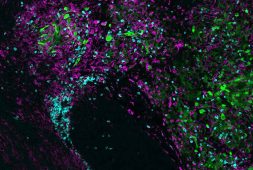Lung Cancer Pill Provides Hope For Patients With Non-Small-Lung-Cancer, Cutting Death Risk By Half

A promising new study has recently unveiled promising results indicating that the drug Tagrisso (Osimertinib) could significantly improve the survival rates of certain early-stage lung cancer patients who have undergone surgery.
This development provides hope and potential breakthroughs for individuals grappling with non-small-cell lung cancer (NSCLC), the most prevalent form of lung cancer, characterized by mutations in the epidermal growth factor receptor (EGFR) gene, a driver of rapid cell growth and cancer’s ability to spread.
The study included 682 patients, all of whom had undergone cancer surgery and exhibited tumors with EGFR gene mutations. Following surgery, these patients were randomly assigned to receive either a daily placebo or an 80-milligram dose of Tagrisso. This targeted therapy is specifically designed to combat tumors harboring mutated EGFR genes, offering a ray of hope to those dealing with this debilitating disease.
According to the study results, which were published in the June 4 copy of the New England Journey of Medicine, after three years, the patients that received Tagrisso had a 51 percent lower risk of death from early-stage lung cancer. The results were also presented at the annual meeting of the American Society of Clinical Oncology.
The five-year overall survival rate was 88 percent for those who were given Tagrisso compared with the 78 percent of those given a placebo. There were too few deaths in the study to truly determine exactly how long the survival benefit might extend. Regardless, this still gives a glimmer of hope to those affected by early-stage lung cancer.
Although Tagrisso is already FDA-approved for those who took in the study, the results provide new evidence that the drug can work even for those with smaller and less advanced tumors, explains Roy S. Herbst, MD, PhD in a statement. Notably, Dr. Herbst is also the principal investigator on the study, as well as the deputy director of the Yale Cancer Center in New Haven, Connecticut.
“The results are impressive. We’re moving this effective drug therapy into the earliest stages of disease,” Dr. Herbst added.
Research Confirms Advantages for Early-Stage Lung Cancer Patients
Tagrisso initially received FDA approval back in 2018 as a beginning treatment option for patients dealing with advanced lung cancer featuring EGFR mutations. However, in 2020, the FDA expanded its approval to include its use as an adjuvant therapy for early-stage lung cancer patients with EGFR mutations, marking a significant milestone in the drug’s therapeutic journey.
“With this approval, patients may be treated with this targeted therapy in an earlier and potentially more curative stage of non-small-cell lung cancer,” said Richard Pazdur, MD, the director of the FDA’s Oncology Center of Excellence and the acting director of the Office of Oncologic Diseases in the FDA’s Center for Drug Evaluation and Research, in a 2020 statement announcing the expanded approval.
The new study results “confirm that adjuvant Tagrisso should remain standard of care for patients with EGFR-driven lung cancer at high risk of recurrence after surgery,” says Susan Scott, MD, an assistant professor of oncology at Johns Hopkins School of Medicine in Baltimore who wasn’t involved in the research.
Oncologists Should Pay Attention
Moreover, oncologists that were on the fence about using Tagrisso for early-stage tumors may now be encouraged with this new evidence, explains professor and the director of the lung cancer medical oncology program at the Cleveland Clinic Taussig Cancer Institute in Ohio, Nathan Pennell, MD, PhD.
It’s worth noting that the FDA’s approval of Tagrisso for early-stage lung cancer was primarily based on disease-free survival (DFS) rates, measuring how long patients remained cancer-free after their initial treatment. In this regard, Tagrisso achieved a remarkable 80 percent reduction in cancer recurrence, a key factor that contributed to the FDA’s decision to approve the drug for early-stage lung cancer.
“For many oncologists in the U.S. this will simply affirm what they were already doing in offering adjuvant Tagrisso based on the prior DFS benefit,” says Dr. Pennell, who wasn’t involved in the new research. “But there were some who waited for the overall survival results, and this should change their practice.”
Despite the need for further research, this study’s findings still provide a beacon of hope for those needing lung cancer treatment. Tagrisso’s potential to enhance the survival rates of patients dealing with early-stage lung cancer marks a significant milestone in the quest to combat this relentless disease.
These promising results not only underscore the drug’s efficacy but also offer optimism for those facing the formidable challenge of non-small-cell lung cancer, instilling hope for bigger and brighter possibilities in the future of cancer treatment.



